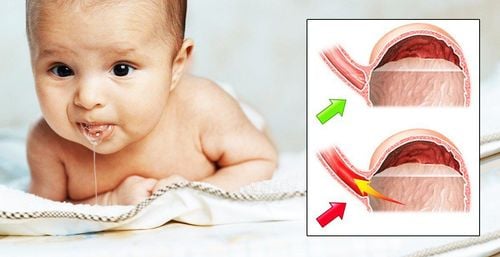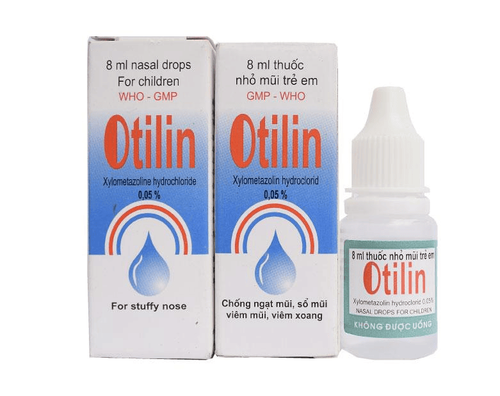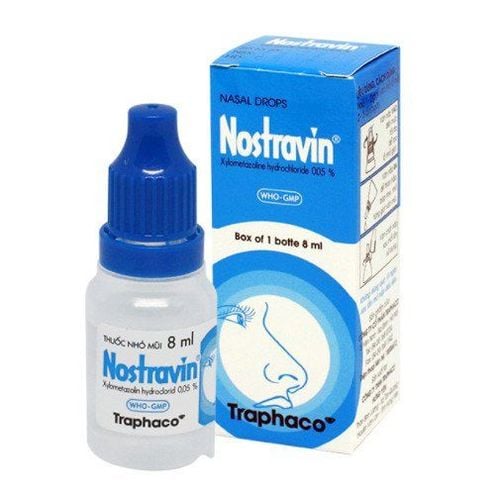This is an automatically translated article.
The article was consulted with Master, Doctor Tran Mai Phuong - Pediatrician - Department of Pediatrics - Neonatology, Vinmec Central Park International General Hospital.There are many causes of prolonged nasal congestion in young children, so parents need to have a method to monitor and take care of their children, to avoid dangerous complications that may occur.
1. What is the cause of prolonged nasal congestion in children?
Nasal congestion is a condition in which one or both nostrils are blocked by mucus or inflammation, making it difficult for children to breathe, sometimes having to breathe through their mouth. If the child is not treated, it will cause more dangerous complications and can lead to facial deformities.There are many reasons why a child has a blocked nose for a long time, the first may be an acute inflammation of the nose caused by a viral infection (such as a cold). In this case, in addition to stuffy nose, the child also has sneezing, sore throat and cough.
The second most common cause is allergic rhinitis. In particular, children also have symptoms such as sneezing, runny nose, itchy eyes. The characteristic feature to identify allergic rhinitis is that children have constant sneezing and often stuffy in both nostrils. The disease occurs most during the flowering season or is persistent year-round due to mold, house bugs, paste, pet dander, dust, etc.
In addition, children may experience other inflammatory conditions such as vasomotor rhinitis, taste rhinitis, and bacterial rhinitis.

Có nhiều nguyên nhân khác nhau gây nghẹt mũi ở trẻ
2. What are the consequences of prolonged untreated nasal congestion?
If a stuffy nose is left untreated, it can become chronic and cause respiratory complications. The severity of complications depends on the cause. If a child has a stuffy nose due to a viral infection, common complications that may occur are ear infections, bronchitis, and sinusitis.If the child has a stuffy nose due to an infection, the child may have a reduced ability to hear due to the swelling, swelling, and pus blocking the passage between the nose and the ear. Prolonged rhinitis can also cause eye infections such as pouchitis, conjunctivitis, eyelid inflammation. If the child has persistent nasal congestion, the risk of facial deformities may also occur, manifested as narrow cleft palate, protruding teeth, protruding chin, collapsed chest, etc.
In addition, nasal congestion also affects children's daily activities such as children becoming sluggish, less flexible, or having headaches, difficulty concentrating, etc. If a child has a long-term nasal congestion and/or is accompanied by symptoms of yellow or green nasal discharge, headache, earache, high fever, cough, chest tightness, parents should take the child to the doctor immediately.
3. What to do when a child has a blocked nose for a long time?
Prolonged nasal congestion affects the health and quality of life of children. However, stuffy nose symptoms can go away with proper treatment. Accordingly, parents can take care of a child with a stuffy nose in the following ways:Sauna or bathe the child with hot water will help somewhat reduce the symptoms of nasal congestion in the child. Because when the steam enters the nose, it will thin the mucus. This measure is only temporary, only relieves nasal congestion in a short time. Salt water spray is also a remedy to help relieve nasal inflammation and congestion. Parents can buy saline nasal spray at the drugstore or prepare it at home with warm water and clean salt. This measure also helps to clear mucus from the nose and sinuses, making the nasal passages clear and easy to breathe. To ensure the best effect, the cleaning solution must be sterile, warm. Applying heat with a damp towel is the next measure that parents should use. Apply heat at a moderate level to avoid burning the baby's skin. Such a hot compress can cause a feeling of congestion and heaviness in the nose and face. Inhaling essential oils can also reduce symptoms of rhinitis and make breathing easier. Simply put a few drops of essential oil in a bowl of boiling water and inhale the steam. If nasal congestion is caused by allergies, you can give your child allergy medicine prescribed by the doctor. Parents should pay attention to the dosage and distinguish between normal side effects and serious side effects to promptly notify the doctor. Anti-congestive drugs are also used in children, causing vasoconstriction, reducing congestion in the nasal mucosa and reducing nasal congestion. There are several nasal sprays that can be used without a prescription. However, parents should take their children to the doctor for an accurate diagnosis and instructions on how to use the medicine properly.

Cha mẹ nên đưa trẻ đến gặp bác sĩ để được thăm khám và hướng dẫn chăm sóc bé
Children with prolonged nasal congestion can leave many complications if not examined and treated early. If the methods of caring for a child with a stuffy nose at home do not improve, parents should take the child to a medical center for examination and treatment, to avoid dangerous developments.
For children to be healthy and develop well, it is necessary to have a nutritious diet in terms of quantity and quality balance. If children are not provided with adequate and balanced nutrients, it will lead to diseases of excess or lack of nutrients, which adversely affect the comprehensive development of children in terms of physical, mental and motor skills.
Children who do not eat properly are at risk of micro-mineral deficiency causing anorexia, growth retardation, malabsorption,... If they notice the above signs, parents should supplement their children with products. The supplement contains lysine, essential micro-minerals and vitamins such as zinc, chromium, selenium, and B vitamins to help fully meet the nutritional needs of children. At the same time, these essential vitamins also support digestion, enhance nutrient absorption, help improve anorexia, and help children eat well.
Parents can learn more:
Signs of zinc deficiency in children
Micronutrient deficiency and failure to gain weight in children
Please regularly visit Vinmec.com website and update useful information to take care of your child. Take care of the baby and the whole family.
Please dial HOTLINE for more information or register for an appointment HERE. Download MyVinmec app to make appointments faster and to manage your bookings easily.













